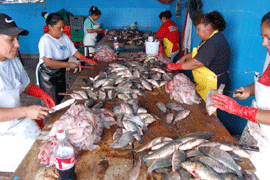One Fish, Two Fish, Good Fish, Bad Fish
Air Date: Week of July 11, 2008

Even when it’s not pan-seared with bacon, farm-raised tilapia might not help lower your cholesterol. (Photo: Greg Turner)
Farm-raised Tilapia is growing in popularity in the United States but new research suggests that some of it may contain high levels of Omega six, which can lead to a myriad of health problems. Professor Floyd Chilton explains the research to host Bruce Gellerman and then Living on Earth gets a response from the American Tilapia Association president Bill Varano.
Transcript
GELLERMAN: Doctors and moms agree - fish is good for you - especially oily fish: salmon, mackerel, and sardines. Besides being brain food, the omega 3 fatty acids in these fish are thought to prevent heart disease and fight cancer. But now, a new federally funded study suggests eating one of America’s favorite fish, tilapia, could actually be harmful. Professor Floyd Chilton and his colleagues at Wake Forest University Medical Center found farm-raised tilapia contains low levels of beneficial Omega 3’s and dangerously high levels of bad Omega 6 fatty acids. Their research appears in the current edition of the Journal of the American Dietetic Association. Professor Chilton welcome to the show.
CHILTON: Thank you, Bruce, it’s great to be with you today.
GELLERMAN: So as I understand it professor, you tested farm-raised tilapia from around the world.

Processing farm-raised tilapia in Petatan, Mexico. (Photo: Steven Miller)
GELLERMAN: These fish have been around since biblical times. Why only now are you measuring the fatty acids in tilapia?
CHILTON: Well there has been an explosion in the consumption of tilapia. Five years ago this fish ranked tenth among seafoods consumed in the United States. Within the last five years it’s moved to five. Among finfish, it is the number two and it is fast approaching Atlantic salmon. So we are now just catching up with the biochemistry, if you will, of these fish as we’ve seen the consumption increase so very, very rapidly.
GELLERMAN: What’s the concern with Omega 6 fatty acid?
CHILTON: Omega 6 fatty acids and especially what we scientists call long-chain Omega 6 fatty acids, in particular a fatty acid called arachidonic acid forms the basis of these pro-inflammatory messengers that control many of the diseases that we see associated with inflammation.
GELLERMAN: So like arthritis, heart disease, autoimmune diseases.
CHILTON: Exactly - allergy, asthma, diabetes - now we’re understanding the roles of these fatty acids in depression and cancer and Alzheimer’s disease. So inflammation is a very, very large umbrella.
GELLERMAN: So compare tilapia to other foods I might eat.
CHILTON: Tilapia would contain far higher concentration of those long-chain Omega 6’s such as arachidonic acid than one would see in a large hamburger or two or three donuts. From an inflammatory messenger perspective, certainly tilapia is not sending the right message.

Dr. Floyd Chilton is a professor at Wake Forest University.
CHILTON: Absolutely. And that’s the reason I believe that this study is so important. Let me be clear: I don’t believe that there’s anything that we can do better for human health than eat the right type of fish, to eat oily fish, to take dietary fish oils. The effectiveness of this approach is just absolutely unequivocal at this point. However, as this study points out, all fish are not the same, and we have to be much more specific in our recommendations especially with a fish that is emerging so rapidly and gaining popularity so quickly.
GELLERMAN: So what is it about farm-raised tilapia?
CHILTON: In a fish-farming situation, the fish that you get depends on what they are fed. Now if these fish are fed, as in the wild, Omega 3 fatty acids and algae, then they’re going to have long-chain Omega 3 fatty acids, which are going to be incredibly beneficial. However, if these fish are fed short-chain Omega 6 products that comes from corn products which is happening so often now then what one sees is the long-chain detrimental Omega 6 fatty acids. So really the fish really are what they eat and we really are what we eat as well.
GELLERMAN: So if you eat wild tilapia as opposed to farmed tilapia you can assume that that’s pretty good for you?
CHILTON: It is. It’s just almost impossible to find wild tilapia. Bruce, I think the other important point here and certainly the important point that I say to people is: we’ve done this before, we went from whole grains to refined grains that really led to an unmitigated health disaster. When we went to, when we changed our animal husbandry practices from grass to corn-fed, really a disaster. A central axiom for us is first “do no harm” and I think we really need to take that approach to our food supply.

(Photo: Greg Turner)
CHILTON: Thank you Bruce, great to talk to you.
GELLERMAN: We called the American Tilapia Association for a response to Professor Chilton’s study, the Association’s President Bill Verano calls the study sound science. And says not all tilapia is created equal.
VERANO: Our position is: “Fish is not fish. Fish is only what it is fed and where it is grown.” We’re strongly in favor of encouraging people to buy domestic where food is carefully selected. We cannot condone what the rest of the world has produced. 98 percent of the Tilapia that’s purchased in the markets in the United States is imported. The feeding program is different, the growing conditions are different. Insist on US, American-grown tilapia and you will have a nutritional, balanced product. And we at the Tilapia Association invite anyone to be willing to test our product at any time.
GELLERMAN: Bill Verano is President of The American Tilapia Association.
Coming up: A new deal to protect the Amazon Rainforest. Stay tuned to Living on Earth!
ANNOUNCER: Support for the environmental health desk at Living on Earth comes from the Cedar Tree Foundation. Support also comes from the Richard and Rhoda Goldman Fund for coverage of population and the environment. And from Gilman Ordway for coverage of conservation and environmental change. This is Living on Earth on PRI—Public Radio International.
Links
Living on Earth wants to hear from you!
Living on Earth
62 Calef Highway, Suite 212
Lee, NH 03861
Telephone: 617-287-4121
E-mail: comments@loe.org
Newsletter [Click here]
Donate to Living on Earth!
Living on Earth is an independent media program and relies entirely on contributions from listeners and institutions supporting public service. Please donate now to preserve an independent environmental voice.
NewsletterLiving on Earth offers a weekly delivery of the show's rundown to your mailbox. Sign up for our newsletter today!
 Sailors For The Sea: Be the change you want to sea.
Sailors For The Sea: Be the change you want to sea.
 The Grantham Foundation for the Protection of the Environment: Committed to protecting and improving the health of the global environment.
The Grantham Foundation for the Protection of the Environment: Committed to protecting and improving the health of the global environment.
 Contribute to Living on Earth and receive, as our gift to you, an archival print of one of Mark Seth Lender's extraordinary wildlife photographs. Follow the link to see Mark's current collection of photographs.
Contribute to Living on Earth and receive, as our gift to you, an archival print of one of Mark Seth Lender's extraordinary wildlife photographs. Follow the link to see Mark's current collection of photographs.
 Buy a signed copy of Mark Seth Lender's book Smeagull the Seagull & support Living on Earth
Buy a signed copy of Mark Seth Lender's book Smeagull the Seagull & support Living on Earth

